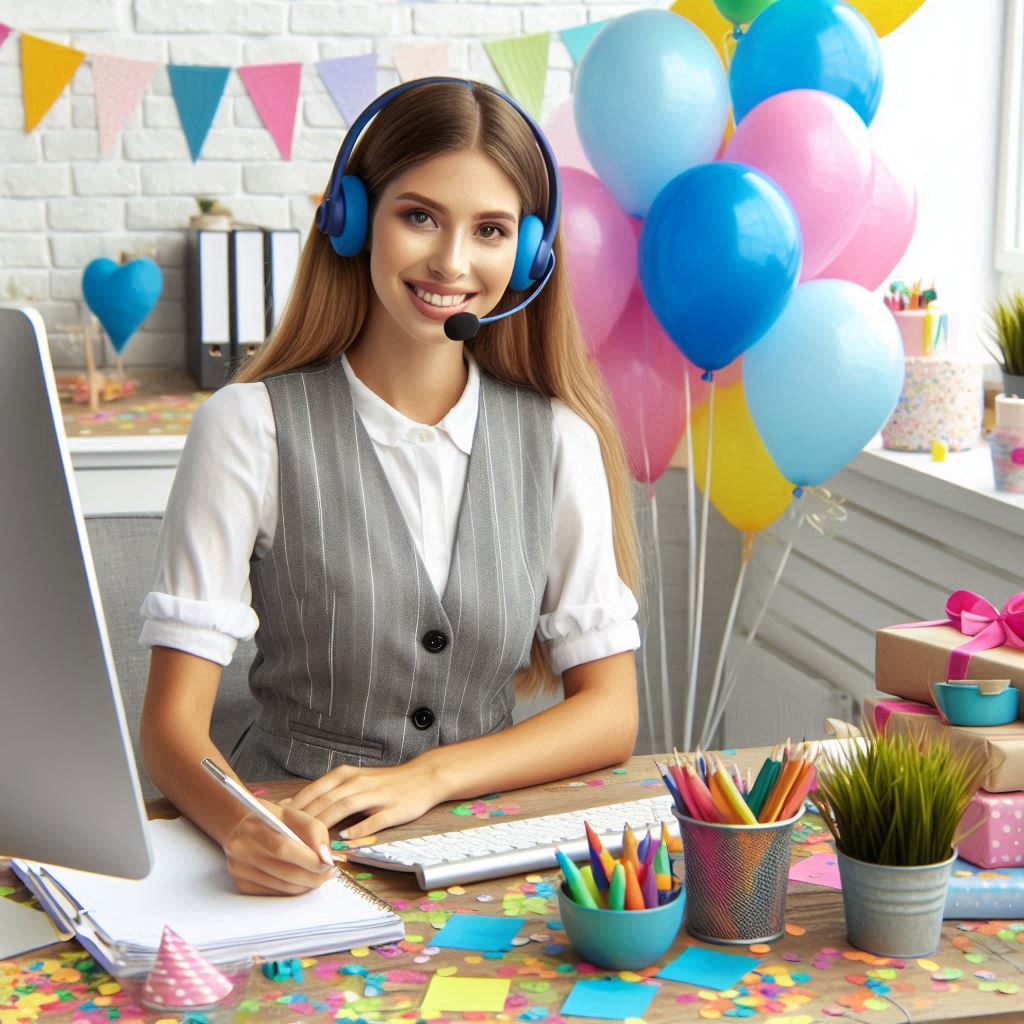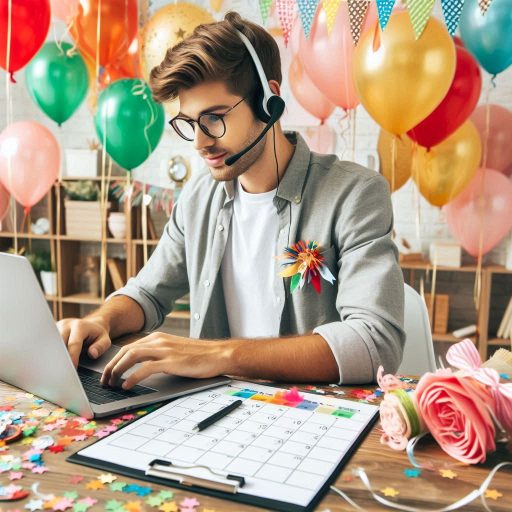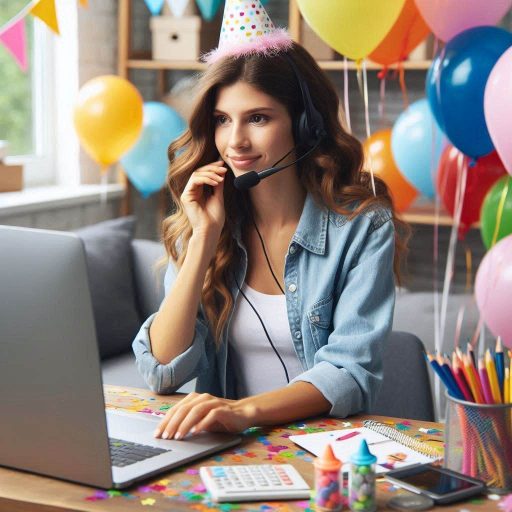Introduction
Creating memorable events is crucial in today’s competitive landscape as event planners creating memorable events.
Events that leave a lasting impression foster connections, build relationships, and enhance brand loyalty.
Attendees often remember experiences more than products or services.
Therefore, event planners play a vital role in curating unforgettable moments.
Event planners are responsible for transforming ideas into reality.
They manage every detail, from concept development to execution, ensuring a seamless experience.
Their expertise and creativity are essential for crafting unique atmospheres that resonate with guests.
Successful event planners understand how to engage attendees and create experiences that stand out.
This blog post aims to provide valuable tips for event planners focused on creating memorable events.
We will explore essential strategies, including understanding the client’s vision, emphasizing personalization, and working with reliable vendors.
Each tip will help event planners enhance their skills and elevate their events.
By implementing these suggestions, planners can deliver extraordinary experiences that leave guests talking long after the event concludes.
With the right approach, every event can become a memorable occasion that delights attendees and fulfills client objectives.
Understand the Client’s Vision
Importance of Understanding the Client’s Goals and Vision for the Event
A successful event starts with a clear understanding of the client’s vision.
Event planners must recognize that every client has unique goals and expectations.
Whether it’s a corporate gala, wedding, or product launch, aligning with the client’s vision is key to creating a memorable event.
Clients invest time and money into events with specific objectives in mind.
Some may want to celebrate a milestone, promote a brand, or create a memorable experience for guests.
Event planners must understand the underlying goals to design an event that truly reflects the client’s needs.
When you know the “why” behind the event, every detail becomes more meaningful.
By understanding the client’s goals, event planners can prioritize the right elements.
For example, if the goal is to promote a product, the focus should be on branding and engagement.
If the objective is to celebrate a wedding, personal touches and emotional moments will take precedence.
Without this clarity, event planners risk missing the mark, leading to client dissatisfaction.
How Event Planners Should Communicate Effectively with Clients to Align on Expectations
Open communication is crucial for aligning on the event’s vision.
Event planners should take the lead in establishing a transparent and collaborative dialogue.
They need to ask questions, listen actively, and confirm their understanding of the client’s desires.
Doing so ensures that both parties are on the same page from the start.
Event planners should schedule regular check-ins with clients throughout the planning process.
This helps ensure that any changes in expectations are addressed early.
It’s essential to create an environment where clients feel comfortable sharing their thoughts and concerns.
This will reduce the chances of misunderstandings or last-minute surprises.
Documentation is also important.
Planners should take notes during meetings, send summaries, and ask for feedback.
This ensures that everyone is working towards the same goal and that all ideas are captured and understood.
Examples of Questions Event Planners Can Ask to Better Understand the Client’s Vision
To fully grasp the client’s vision, event planners must dive deep into the purpose and desired atmosphere of the event.
Asking the right questions is key to uncovering these insights.
Event planners can start by asking, “What is the primary goal of this event?”
This helps to clarify the overarching objective, whether it’s celebration, promotion, or engagement.
Additional questions like “What is the mood or theme you envision?”
And “What impression do you want guests to leave with?” help in understanding the emotional tone and desired experience.
Planners can also ask, “Who is your target audience?” to tailor the event to the specific needs and preferences of the guests.
Exploring elements like entertainment, decor, and budget will further shape the overall design.
By communicating effectively and focusing on the client’s goals, event planners can create events that are personal and memorable.
Every successful event is built on a shared understanding of the client’s vision, combined with careful planning and attention to detail.
Read: Nail Technician Networking: Building Industry Connections
Create a Detailed Event Plan
A well-executed event requires a comprehensive and detailed plan.
Event planners who create thorough plans can anticipate challenges and ensure everything runs smoothly.
Failing to plan increases the risk of missed details, budget overruns, and last-minute chaos.
Significance of creating a comprehensive event plan
An event plan acts as a roadmap that guides the planning process from start to finish.
It helps event planners stay organized and maintain a clear focus on the event’s goals.
A strong plan also prevents important aspects from being overlooked, helping to keep the event on track.
It ensures everyone involved, from vendors to staff, understands their roles and responsibilities.
By planning in detail, event planners can spot potential issues early, allowing time to find solutions.
A detailed plan minimizes the chances of surprises, making it easier to manage changes or emergencies that arise.
The elements that should be included in the event plan
A well-rounded event plan should include key elements such as the budget, timeline, and logistics.
A clear budget sets the foundation for the entire event.
It helps determine what can realistically be achieved within the client’s financial limits.
Budgeting for every aspect, including venue costs, catering, entertainment, and decorations, ensures no expenses are overlooked.
The timeline is another essential component.
It outlines deadlines for various tasks, from booking vendors to finalizing guest lists.
A well-organized timeline keeps the planning process on schedule and ensures that no task is left until the last minute.
Logistics, including transportation, seating arrangements, and equipment setup, should also be accounted for.
Ensuring smooth logistical operations allows the event to flow without unnecessary delays or confusion.
Logistics management includes coordinating with vendors, managing guest arrivals, and ensuring the availability of essential supplies.
Tips on how event planners can stay organized and ensure all details are accounted for
Staying organized is crucial when managing multiple elements of an event.
Event planners should use digital tools like project management software to track tasks, timelines, and budgets.
These tools provide clear visibility into the progress of each task and help planners stay on top of deadlines.
Regularly updating the event plan as new information becomes available is essential.
Planners should also schedule check-ins with clients and vendors to ensure everyone remains aligned.
Setting reminders for critical tasks can help prevent any detail from slipping through the cracks.
Maintaining a checklist of key tasks can also be highly effective.
From confirming vendors to managing guest lists, a checklist keeps all critical tasks visible and trackable.
Prioritizing tasks based on importance and deadlines will help planners focus on what needs attention first.
Creating a detailed event plan is the backbone of a successful event.
Event planners who remain organized and account for every detail will deliver smooth, memorable experiences for their clients.
Read: The Role of Technology in Modern Pet Grooming
Pay Attention to Details
Importance of Paying Attention to Small Details That Can Make a Big Impact on the Overall Event Experience
Paying attention to small details can elevate an event from ordinary to extraordinary.
Event planners must focus on these elements to create a seamless experience.
Neglecting the finer points can leave a negative impression, no matter how grand the overall event.
Every detail contributes to the atmosphere and flow of an event.
Small touches like personalized menus, thoughtful decor, or perfectly timed lighting can create lasting memories for guests.
Event planners who focus on details ensure that the event feels polished and professional.
Overlooking minor aspects, such as unclear signage or uncomfortable seating, can frustrate guests and disrupt the experience.
Details are what guests notice, even subconsciously.
They set the tone, enhance the ambiance, and make the event feel intentional.
Successful event planners know that perfecting these aspects elevates the overall quality of the event, leaving guests feeling valued and impressed.
Examples of Details That Event Planners Should Consider, Such as Seating Arrangements, Signage, and Decor
Several details significantly impact the guest experience.
Seating arrangements, for example, are crucial for ensuring comfort and accessibility.
Whether it’s a corporate event or a wedding, seating should allow for easy interaction among guests and accommodate any special needs.
Signage is another key element.
Clear, well-placed signs guide guests through the event and reduce confusion.
From directions to registration tables to labeling different event areas, signage plays a functional and aesthetic role.
Decor choices also matter.
The color scheme, table settings, and lighting should align with the event’s theme and purpose.
Subtle elements like floral arrangements or creative centerpieces can enhance the atmosphere without overwhelming the space.
Food presentation is another often overlooked detail.
How food is displayed and served influences guests’ perception of quality.
Even the smallest elements, like napkin placement or unique serving utensils, contribute to the experience.
How Event Planners Can Ensure All Details Are Executed Flawlessly
To ensure every detail is executed flawlessly, event planners should create detailed checklists.
These lists should cover all aspects of the event, from venue setup to post-event clean-up.
Assigning specific tasks to team members ensures accountability and prevents anything from being overlooked.
Planners should also conduct site visits before the event.
Walking through the venue allows planners to visualize where signage, seating, and decor should go.
This practice helps address any issues in advance and ensures smooth execution on the event day.
Testing elements like lighting, sound, and food service before guests arrive can prevent unexpected problems.
Running through a final checklist with vendors and staff ensures that everything is in place.
Paying attention to details can transform an event and create an exceptional guest experience.
Event planners who carefully manage these small elements will leave a lasting impression, ensuring the event is both memorable and professional.
Read: Customer Service Tips for Pet Grooming Professionals

Curate Engaging Experiences
Value of Creating Experiences That Engage Attendees and Leave a Lasting Impression
Engaging experiences are the key to hosting memorable events.
Event planners must prioritize creating activities that captivate attendees and leave a lasting impression.
When guests actively participate, they feel more connected to the event and its purpose.
Engaged guests are more likely to share positive feedback and remember the event long after it ends.
Creating memorable experiences is about more than just entertainment; it’s about building meaningful moments that resonate with guests.
Event planners who focus on these experiences can ensure that the event stands out and is remembered fondly.
How Event Planners Can Incorporate Interactive Elements, Entertainment, and Unique Activities
Incorporating interactive elements into an event makes the experience more dynamic and memorable.
Event planners can introduce activities like live polls, Q&A sessions, or audience-participation games that encourage guests to engage with the event.
These elements give attendees a sense of involvement and create a shared experience that enhances their overall enjoyment.
Entertainment also plays a key role in creating engaging experiences.
Live music, DJs, comedians, or performers can help set the tone and keep guests entertained.
For corporate events, incorporating keynote speakers or industry experts can add value and spark meaningful conversations among attendees.
At social events like weddings or parties, planners can introduce dance floors, photo booths, or live art installations that encourage interaction.
Unique activities can further enhance the guest experience.
Planners can create personalized stations where guests can interact with products or services.
For example, setting up tasting stations at food or beverage events allows guests to engage with the offerings directly.
At conferences or trade shows, interactive workshops or demos offer attendees hands-on experiences, making the event more memorable.
Tips on How to Tailor Experiences to the Audience’s Preferences and Interests
Tailoring the event to the audience’s preferences is essential to ensuring engagement.
Event planners should start by understanding the demographics, interests, and expectations of their guests.
A corporate audience may prefer educational workshops, while a social gathering might call for entertainment-focused activities like live performances or games.
One way to personalize experiences is by offering choices.
Planners can create different activity zones catering to varying interests.
For instance, at a large event, one area could focus on networking, while another offers entertainment or relaxation spaces.
Giving guests options ensures that everyone finds something that appeals to them.
Event planners should also gather feedback before the event to better understand what the audience values.
Surveys or direct communication with key stakeholders can provide insights that help shape the event.
This helps in delivering a tailored experience that aligns with the guests’ preferences.
Curating engaging experiences is essential for event success.
Interactive elements, entertainment, and personalized activities create memorable moments that resonate with attendees, making the event unforgettable.
Read: Nail Technician Etiquette: Dos and Don’ts
Transform Your Career Today
Unlock a personalized career strategy that drives real results. Get tailored advice and a roadmap designed just for you.
Start NowFocus on Personalization
Benefits of Personalizing the Event Experience for Attendees
Personalization makes an event more meaningful and memorable.
Attendees feel valued when planners customize the experience to their preferences.
Personalized events create stronger emotional connections between guests and the event, enhancing engagement and overall satisfaction.
When guests recognize that the event was designed with their needs in mind, they are more likely to have a positive and lasting impression.
Tailoring the event experience also increases guest involvement.
Personalization encourages attendees to participate, fostering a sense of inclusion and making the event feel unique.
When planners customize elements like food, activities, or gifts, they create a distinct atmosphere that leaves guests feeling special.
The added attention to detail enhances the guest experience, making the event more impactful.
Ways Event Planners Can Customize Aspects of the Event
Event planners can personalize an event in many ways, starting with food and beverage options.
Offering customizable menus or allowing guests to choose from different dietary options makes the experience more enjoyable.
For example, setting up stations for guests to select their own toppings or flavors allows them to tailor their meals to their tastes.
This small touch goes a long way in making guests feel catered to.
Swag bags provide another opportunity for personalization.
Instead of offering generic gifts, planners can tailor swag bags to each guest’s preferences or interests.
Including personalized items like name-engraved products or curated gifts based on guest profiles adds a thoughtful touch.
Personalization in gifts demonstrates care and attention, leaving guests with something memorable from the event.
Branding offers a powerful way to incorporate personalization.
Planners can integrate custom branding throughout the event space to reflect the company or theme while still catering to the guest experience.
Personalized name tags, branded welcome notes, or even customized event programs are subtle ways to make guests feel involved.
For corporate events, integrating attendee-specific information into the event app or materials makes the experience more tailored.
Examples of Successful Events That Have Effectively Utilized Personalization
Many successful events have shown how personalization can enhance guest experiences.
For example, corporate conferences often customize name tags with detailed information, allowing attendees to easily network based on shared interests.
Event apps that tailor schedules and provide personalized content recommendations are also effective tools for enhancing attendee engagement.
Weddings often excel at personalization by incorporating unique touches that reflect the couple’s story.
Luxury brand events frequently leverage personalization to elevate the guest experience.
Brands may offer customized product demonstrations, monogrammed gifts, or exclusive VIP experiences tailored to specific attendees.
By focusing on personalization, event planners create unique, memorable experiences that resonate with guests.
Customized elements help build deeper connections, resulting in more engaging and successful events.
Personalization transforms ordinary moments into extraordinary memories for everyone involved.
Work with Reliable Vendors and Partners
Importance of Collaborating with Trustworthy Vendors and Partners
Partnering with reliable vendors is essential for successful events.
Vendors provide critical services like catering, décor, and audio-visual equipment.
Trustworthy vendors help ensure everything runs smoothly and efficiently.
When vendors deliver as promised, the event planner can focus on other aspects without stress.
Choosing dependable vendors prevents last-minute issues that could negatively impact the event.
A successful event relies on each vendor fulfilling their role to meet the event’s overall vision.
Working with reliable partners also boosts an event planner’s reputation.
Vendors who deliver high-quality service reflect positively on the planner’s ability to manage the event.
Satisfied clients will remember the seamless experience and likely recommend the planner for future events.
Ultimately, choosing the right vendors and partners is a key factor in delivering a successful and memorable event.
How Event Planners Can Build Strong Relationships with Vendors
Building strong relationships with vendors requires effective communication and mutual respect.
Event planners should invest time in getting to know their vendors’ strengths and limitations.
This helps in assigning the right tasks based on the vendor’s capabilities.
Open communication builds trust and ensures that both parties work towards a common goal.
Maintaining transparency throughout the planning process is vital.
Event planners should share all necessary details about the event with vendors, including timelines, expectations, and any specific requirements.
This ensures that vendors are prepared and can address potential challenges early on.
Planners should also be willing to listen to vendor feedback, as their experience can contribute valuable insights to improve the event.
To strengthen relationships, event planners should also express appreciation for a job well done.
Recognizing a vendor’s hard work and professionalism fosters long-term partnerships.
When vendors feel valued, they are more likely to go the extra mile, contributing to the overall success of future events.
Tips on How to Effectively Communicate and Delegate Tasks to Vendors
Clear communication is essential when working with vendors.
Event planners should provide vendors with detailed instructions for their specific roles.
This includes setting clear deadlines, offering visual references, and clarifying expectations from the start.
When everyone understands their responsibilities, the event planning process becomes more streamlined.
Regular check-ins with vendors help ensure tasks are progressing as planned.
Planners should schedule these updates well in advance to allow time for adjustments if needed.
Consistent communication prevents misunderstandings and keeps everyone on track toward the event’s goals.
Delegating tasks effectively involves assigning vendors tasks that match their expertise.
Event planners must trust their vendors to handle their responsibilities, but they should remain available for guidance when necessary.
For example, when working with a caterer, provide a clear menu plan but allow the chef creative freedom to adjust dishes based on their expertise.
By working with reliable vendors and maintaining clear communication, event planners can ensure seamless event execution.
Strong relationships with vendors lead to smoother collaboration, resulting in a more successful and enjoyable event for all involved.
Conclusion
Creating memorable events requires careful planning and execution.
Event planners play a crucial role in curating unforgettable experiences for attendees.
Understanding the client’s vision helps ensure alignment and satisfaction throughout the planning process.
Developing a detailed event plan guarantees that every aspect is organized, from budget to logistics.
Paying attention to small details significantly impacts the overall guest experience.
Personalization adds a unique touch that resonates with attendees, making them feel valued.
Working with reliable vendors and partners ensures seamless collaboration, enhancing the event’s success.
Building strong relationships with vendors leads to smooth execution and high-quality services.
By implementing the tips discussed in this blog post, event planners can elevate their skills.
Effective communication and attention to detail are vital for creating engaging experiences.
Encourage yourself to explore new ideas and strategies that will make your events stand out.
Remember that every successful event leaves a lasting impact on guests.
Strive to create experiences that guests will cherish and remember long after the event concludes.
With dedication and creativity, you can transform ordinary events into extraordinary memories that attendees will treasure.




